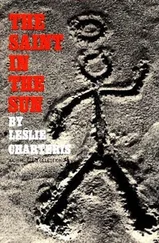“Only a day or two.”
“I’m sorry — it was nice meeting you.”
She gave him her hand, all graciousness and poise again, and by then it was hard to believe that only a few seconds ago she had seemed to be transfixed with stark terror.
“What on earth is this Chesterfield Club business?” Kathleen demanded as soon as they were at a safe distance.
“You heard me,” Simon said. “As a student of all the great philosophers and bores—”
“Don’t give me that,” she said. “I saw what it did to her when you first mentioned it.”
Simon handed over a dollar in exchange for two ice-cream cones which were being practically forced into their hands. He gave his to the first infant that passed, who promptly squashed it on its mother’s best afternoon dress.
“You’re much too young to remember,” said the Saint happily, “but back in the wildest Prohibition days of Kansas City, the Chesterfield Club was an institution that travelers came from all over to see. It was a place where the tired business man could really get a lift with his lunch. All the waitresses were stark naked.”
“Oh.” Kathleen gulped. “Now I can see why Aunt Flo was shocked.”
“Would you say ‘shocked’ was the word?” Simon asked gently.
He lighted a cigarette and stared through a veil of smoke at the edifying spectacle of a bejeweled dowager leaning over the rail of an enclosure called Fortune’s Fishpond, cane pole in hand, angling with intense concentration for a bottle of Bollinger.
“Even the most sheltered ladies in town at the time must have heard of it,” he said. “If a man referred to it in front of them, I can picture them being righteously scandalized, or freezing into the We Are Not Amused reaction. But can you see any of them looking downright terrified, as if the next thing they heard might be the end of the world?”
“But it couldn’t have meant anything personal to Aunt Flo! I mean—”
“No, not that.” He grinned. “I don’t think she was ever a waitress at the Chesterfield Club. Even that long ago, she’d’ve been a bit old for the job.”
“Then what do you make of it?”
“You wanted to get me interested,” he said, “and you have. How can I meet Brother Powls?”
This could not have been an insuperable problem at the worst, but since it was that kind of charity fair, and Santa Barbara is that kind of place, it proved even easier than he would have anticipated. They were continuing their idle stroll through the grounds, discussing the best pretext they might use for dropping in at Mr Powls’s apartment, when Kathleen suddenly clutched Simon’s arm.
“Talk of the devil,” she said, “there he is — over there, in the light gray jacket.”
Mr Alton Powls did not look much like a devil, except as he might be depicted in the more sophisticated modern type of fantasy. From his mildly jaunty Panama hat down to his polished black and white shoes, he looked like a typical member of the county set in which he was imperturbably working for acceptance. His attendance at this garden carnival, properly viewed, was not even surprising at all: on the contrary, it was a social obligation which he could hardly have avoided.
Only the Saint’s peculiarly analytic eye would have noted, as they approached on a calculated collision course, a certain revealing shuffle in the way Mr Powls walked, and the no less typical way his glances roved restlessly over a wide area with little corresponding movement of his head.
“Why, good afternoon, Mr Powls,” Kathleen said as they met.
He had seen them coming already, but he raised his hat with the most urbane spontaneity.
“Miss Holland. How nice to see you taking a day off.”
He was probably not much over sixty, a thin man with a sedate little bulge below his belt. His somewhat lumpy face was clean shaven and pallid, his hair sparse and lank. His lips were tight and gristly, and scarcely moved when he spoke. Simon could see the superficial reasons for describing him as a Creep, but his manner was easy and polite.
Kathleen said, “This is Mr Tem—”
“Templar,” said the Saint. He amplified it, very clearly: “Simon Templar.”
“Simon Templar,” Mr Powls repeated. “Somehow, the name sounds familiar.”
His fingers, which had gone out automatically to meet the Saint’s cordial hand, lay in the Saint’s grasp like cold sausages.
“You could have heard it,” Simon said affably.
“You couldn’t — by any chance — be any relative of that man they call the Saint?”
“I am the Saint,” Simon beamed.
Those who know the Saint at all well will recognize at once that this was totally unlike him. But he did it this time, and Mr Powls retrieved his hand quickly, as if afraid that it might not be given back.
“Are you really?” said Mr Powls. He coughed, to clear a trace of hoarseness from his voice. “But you aren’t expecting to find anything to merit your attention here, are you?”
“I never know where I’ll find those things,” said the Saint cheerfully. “But I’m always on the lookout for them. And there’s no place like a town full of respectable retired people. They all buy each other’s stories, but whoever checks on them? A guy could come here straight from Leavenworth and give out that he was a retired Bible salesman, and no one would even ask him to prove it by naming the four Gospels.”
“That’s very interesting,” said Mr Powls faintly.
“Not that I think there’s anything crooked about this shindig,” Simon went on exuberantly. “In fact, it must be on the level, because they just let me win a pot at Bingo. Look.”
He pulled out of his pocket the card which he had kept as a souvenir, and thrust it upon Mr Powls in such a way that the other was virtually forced to take it from him.
“That’s wonderful,” said Mr Powls, returning the card as quickly as he could. “Really, it gives me an inspiration. I must go there and try my luck. If you’ll excuse me.” He raised his hat to Kathleen again, and inclined his head to the Saint. “Perhaps we’ll meet again later.”
“I hope so,” Simon said heartily. “Let me know if you see any other old lags around.”
Mr Powls moved away, not hurriedly, but without looking back.
“I’m getting rather baffled,” Kathleen said, “and now I don’t think I’m enjoying it.”
“You got me started,” Simon reminded her. “And I got some results.”
“I didn’t see much, except that you upset him.”
“Does that matter? You said he was a Creep, anyway.”
“But you were almost objectionable.”
“No. A bit corny and collegiate, maybe. A shade heavy-handed with the humor. But I had to be. I wanted to start something. A respectable citizen may be bored by the kind of kidding that suggests he’s an old jailbird, but he isn’t offended, because it’s too ridiculous to take seriously. Only an old lag would be jolted, because it’s too close to home.”
“You think he is an ex-convict?”
“I’ve no more doubt about it. But I saw it first in the way he walks and talks and looks around.”
“Then why did you go on — the way you did?”
Simon shrugged. His sky-blue eyes were altogether lazy now, and seemed to be ranging perspectives far outside the eucalyptus trees and formal hedges of the manorial grounds which had been turned over to the benefit.
“I’m a catalyst,” he said. “You know what that is, in chemistry? You throw a certain catalyst into a certain mixture, and nothing happens to it itself, but all hell breaks loose around it. All the other ingredients seethe up and do back-flips into new transformations. That’s me. Half the time I don’t have to do anything except be around. Somebody hears I’m the Saint, and I shoot a few arrows in the air, and the fireworks start. Like this. It’s no crime to be an ex-convict, unless you got out through a tunnel. Or to be a Creep, even. And I don’t know what Aunt Flo is sweating out. So there’s nothing much I could do about ’em. And yet I’ve got an idea that events are already on the march.”
Читать дальше












